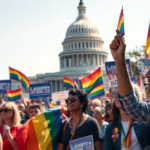DSG Commitments to Enhance Senate Diversity: A New Era for Representation
In a landmark initiative, the Diversity Senate Group (DSG) is taking significant strides toward improving diversity and representation within legislative bodies across the United States. With a strong commitment to including underrepresented groups within the senate, DSG aims to foster a more inclusive and equitable political landscape, ensuring voices from all walks of life are heard and represented.
Commitment to Diversity
The commitment by DSG is to incorporate a broader spectrum of identities and experiences into law-making processes, with particular focus on marginalized communities historically underrepresented in the senate. Although the specifics of how DSG plans to implement these changes remain in discussion, the group has made it clear that they’ll utilize strategies ranging from advocating policy reforms to educational initiatives aimed at encouraging participation from diverse candidates.
Maria Johnson, a spokesperson for DSG, stated, “Our aim is to bridge the gap that has existed for too long in the realms of governance and decision-making. It’s not just about fulfilling quotas but about engaging and incorporating perspectives that can lead to more holistic and informed legislative outcomes.”
Local Impact and Community Benefit
The initiative’s impact is poised to resonate throughout communities nationwide, including in areas traditionally removed from such diversity efforts. This push for increased representation promises to improve legislative responsiveness to issues facing local communities, from socioeconomic disparities to cultural recognition.
For residents of various backgrounds, especially those in minority-dense regions, this means that their unique challenges and needs may receive more attention in legislative arenas. By ensuring a seat at the table, DSG’s initiative strives to guarantee that policy measures better reflect the realities faced by diverse populations.
A Continuation of Efforts and Historical Context
The movement to improve diversity within official chambers is not new but has gained increasing momentum over recent years. Prior efforts have laid foundational steps, notably by groups advocating for voting rights, civic engagement, and equitable representation. DSG’s current commitment can be viewed as an evolution of these efforts, forward-thinking in its strategies and goals.
Jonah Green, a political analyst from Woke News, argues, “What we’re seeing with DSG’s initiative is not just a response to current societal demands but a necessary evolution of democratic structures that historically have been slow to mirror the diversity of their constituents. This could be pivotal for genuine equality in policy-making across the country.”
Prospective Outcomes and Challenges
The long-term implications of DSG’s diversity commitment are promising but inherently complex. Achieving such profound change in representation involves overcoming entrenched structural barriers and navigating a landscape often resistant to rapid change.
However, the potential benefits are vast. More diverse legislative bodies can lead to more innovative solutions that take into account a wider array of perspectives. Issues such as racial inequality, gender parity, and LGBTQ+ rights may see new and transformative approaches as a more representative body works collaboratively towards progress.
On the other hand, critics caution against oversimplifying the path to increased diversity. Dr. Lisa Thornton, a sociologist specializing in inclusive governance, highlights the necessity of careful implementation. “While the intention is commendable, real change demands comprehensive strategies that address systemic issues, from campaign finance reform to supporting candidates throughout their political careers,” she notes.
Diverse Perspectives in Action
In the discourse surrounding DSG’s initiative, various perspectives emerge. Supporters emphasize the positive local impact, suggesting that genuine representation is crucial for democratic integrity and the balanced distribution of resources. They argue that policies are most effective when crafted by those who intimately understand the complexities they aim to address.
Conversely, some skeptics worry about the execution of such initiatives, raising concerns about tokenistic approaches or superficial compliance. Addressing these critiques, Johnson reassures that the focus remains steadfastly on authentic engagement and support for underrepresented groups.
Resources and Community Engagement
Encouraging participation and awareness, DSG invites individuals, communities, and organizations to engage in ongoing dialogues via their website and at scheduled town hall meetings across the nation. These gatherings aim to facilitate transparent communication between the public and DSG representatives, enabling a shared pathway toward inclusive governance.
The efforts by DSG signify more than just policy change—it’s a call to action for communities to participate actively in shaping their futures. By embracing diversity, not just as a goal but as a fundamental principle, societal transformation becomes a shared endeavor, reflecting the true essence of democracy.
As the policies and initiatives further unfold, Woke News remains committed to providing thorough coverage and insights into how these changes affect local communities and the broader political spectrum. The path laid by DSG could, ultimately, redefine representation and equity in senate bodies throughout the United States, ushering in a new era of inclusive governance.







